#agriculture Land
Explore tagged Tumblr posts
Text
பிரத்தியேகமுதலீட்டுவாய்ப்புகளுக்கானஆஃப்-மார்க்கெட்சொத்துக்களைஎவ்வாறுகண்டுபிடிப்பது ?
மலிவு & குறைந்த விலையில் நில விற்பனை மற்றும் வீட்டு கட்டுமானம்
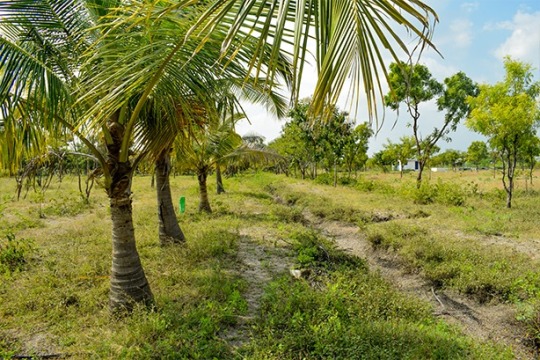
அறிமுகம் :-
அனுபவமுள்ள ரியல் எஸ்டேட் முதலீட்டாளர்கள் மற்றும் சொத்து ஆர்வலர்களுக்கு, சந்தைக்கு வெளியே உள்ள சொத்துக்கள் பிரத்தியேக முதலீட்டு வாய்ப்புகளின் மறைக்கப்பட்ட புதையலைக் குறிக்கின்றன. பாரம்பரிய பட்டியல்களைப் போலன்றி, சந்தைக்கு வெளியே உள்ள பண்புகள் பொதுவில் விளம்பரப்படுத்தப்படுவதில்லை, இதனால் அவை குறைவா�� போட்டித்தன்மையை உருவாக்கி சிறந்த ஒப்பந்தங்களை வழங்குகின்றன. இருப்பினும், அத்தகைய பண்புகளைக் கண்டறிவதற்கு ஒரு மூலோபாய அணுகுமுறை மற்றும் இணைப்புகளின் நெட்வொர்க் தேவை. இந்தக் கட்டுரையில், பிரத்யேக முதலீட்டு வாய்ப்புகளை நாடுபவர்களுக்கு சந்தைக்கு வெளியே உள்ள சொத்துக்களை வெளிக்கொணருவதற்கான தந்திரோபாயங்கள் மற்றும் முறைகளை ஆராய்வோம்.
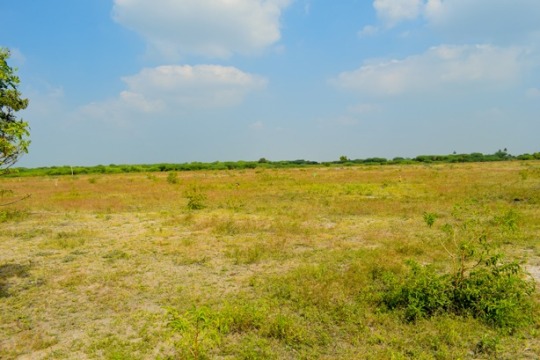
சந்தைக்குப் புறம்பான பண்புகளைக் கண்டறிவது என்பது விடாமுயற்சி, வலுவான நெட்வொர்க் மற்றும் செயலூக்கமான அணுகுமுறை தேவைப்படும் ஒரு கலை. நெட்வொர்க்கிங், டிஜிட்டல் பிளாட்ஃபார்ம்கள், தொழில் வல்லுநர்களுடனான ஒத்துழைப்பு மற்றும் டாலருக்கு ஓட்டுதல் போன்ற ஆக்கப்பூர்வமான முறைகள் ஆகியவற்றின் கலவையைப் பயன்படுத்துவதன் மூலம், முதலீட்டாளர்கள் லாபகரமான வருமானத்திற்கான குறிப்பிடத்தக்க சாத்தியமுள்ள பிரத்தியேக வாய்ப்புகளை வெளிப்படுத்தலாம். இந்த செயல்பாட்டில் பொறுமை அவசியம் என்பதை நினைவில் கொள்ளுங்கள், மேலும் ரியல் எஸ்டேட் சமூகத்திற்குள் உறவுகளை உருவாக்குவது இந்த மறைக்கப்பட்ட முதலீட்டு ரத்தினங்களை அணுகுவதற்கான திறவுகோலாகும். மகிழ்ச்சியான வேட்டை!
#agriculture land#madurai#madurailandpromoters#landforsale#realestate#residential land for sale in madurai#low budget#real estate investing#tamilnadu#homesweethome#beloved family
2 notes
·
View notes
Text

Find competitively priced agricultural plots in Hyderabad’s fast-developing areas.
#real estate#Agriculture Land For sale in Hyderabad#agriculture Land#Real Estate in Hyderabad#Farm Land in Hyderabad
0 notes
Text

Raj Bhathal Real Estate Agency connects you with the best agricultural land for sale across Canada. Whether you're a farmer expanding your operations or an investor entering the farm market, we have the perfect options for you. Our listings feature fertile land in prime locations, ideal for farming, ranching, or other agricultural ventures. We make the buying process simple and stress-free with expert guidance and market insights. Invest in land that offers stability, growth, and long-term value. Start your agricultural journey today with Raj Bhathal Real Estate Agency by your side.
0 notes
Text
N:P:K (13:00:45) product is an excellent fertilizer. It improves the vegetative growth in the steams, roots in the early stages and also in the seed and flower formation, bud growth and reducing fruit ripening.
1 note
·
View note
Text
Agriculture Land on Yamuna Expressway, Greater Noida
Investing in Agriculture Land on Yamuna Expressway, Greater Noida: A Lucrative Opportunity

In the bustling real estate market of Greater Noida, nestled alongside the Yamuna Expressway, lies a unique investment opportunity that combines the allure of agriculture with the promise of future development. Agriculture land on Yamuna Expressway has become increasingly sought after for several compelling reasons, making it an attractive choice for investors and agricultural enthusiasts alike.
Why Invest in Agriculture Land on Yamuna Expressway, Greater Noida?
Strategic Location: The Yamuna Expressway is not just a highway; it's a corridor of development connecting Greater Noida to Agra. This connectivity enhances the accessibility and potential value of agricultural land along its stretch. Proximity to major urban centers like Delhi and Noida also ensures future infrastructure and economic growth.
Potential for Appreciation: Land prices along the Yamuna Expressway have shown a steady appreciation trend due to planned infrastructure projects, industrial developments, and residential expansions. Investing now could yield substantial returns as the area continues to develop.
Favorable Agricultural Conditions: The region benefits from fertile soil and a favorable climate for agriculture, making it suitable for a variety of crops and agricultural activities. This not only supports sustainable farming practices but also adds to the land's intrinsic value.
Diverse Usage Opportunities: Besides traditional farming, agricultural land on Yamuna Expressway can be utilized for horticulture, organic farming, floriculture, and even as potential sites for farmhouses or weekend retreats.
How to Buy Agriculture Land on Yamuna Expressway, Greater Noida
Investing in agriculture land requires careful consideration and due diligence. Here’s a step-by-step guide to help you navigate the process:
Research and Planning: Begin by researching the current market trends, future development plans, and zoning regulations for agriculture land along the Yamuna Expressway. Understanding these factors will guide your decision-making process.
Legal Check: Verify the land ownership, title deeds, and any legal encumbrances associated with the property. Consulting with a legal expert can ensure that the transaction is legally sound and free from disputes.
Infrastructure and Amenities: Assess the availability of basic infrastructure such as water supply, electricity, road access, and proximity to markets or transportation hubs. These factors are crucial for both farming operations and potential future development.
Financial Considerations: Determine your budget and explore financing options if needed. Factor in costs such as stamp duty, registration fees, and ongoing maintenance expenses when calculating the total investment.
Engage with Reliable Realtors: Partnering with a reputable real estate agency like Shree Krishan Estates can simplify the buying process. Their expertise in the local market and understanding of legal intricacies can ensure a smooth transaction and peace of mind.
Why Choose Shree Krishan Estates to Buy Agriculture Land on Yamuna Expressway, Greater Noida
Shree Krishan Estates stands out as a trusted name in real estate for several compelling reasons:
Expertise and Experience: With years of experience in the Greater Noida real estate market, Shree Krishan Estates offers unparalleled knowledge and insights into the local landscape.
Transparent Transactions: They prioritize transparency and ethical business practices, ensuring that every transaction is conducted with integrity and clarity.
Wide Range of Options: Whether you are looking for a small plot for personal farming or a larger investment opportunity, Shree Krishan Estates offers a diverse portfolio of agricultural land options to suit your needs.
Customer-Centric Approach: Their customer-centric approach ensures that your specific requirements and preferences are met, guiding you through every step of the buying process with personalized attention.
Investing in agricultural land on Yamuna Expressway, Greater Noida, presents a unique opportunity to combine financial growth with the satisfaction of contributing to sustainable agricultural practices. With careful planning and the right partners like Shree Krishan Estates, your investment could yield fruitful rewards in the years to come. Whether you are a seasoned investor or a first-time buyer, exploring this promising sector could be the key to securing your future in real estate.
0 notes
Text
What are the key factors to consider when searching for agriculture land for farming or investment purposes?

Introduction
Investing in agriculture land for sale in jodhpur can be a rewarding venture, whether for those looking to start a farming operation or seeking a long-term investment. However, the process of finding the right piece of land requires careful consideration of various factors to ensure success. we will explore the key factors to consider when searching for agriculture land for farming or investment purposes.
1. Location and Accessibility:
The first and foremost consideration is the location of the agriculture land. Proximity to markets, transportation hubs, and essential services is crucial. Accessibility not only impacts the cost of transportation for goods but also influences the convenience of managing the property.
2. Soil Quality and Composition:
The quality of the soil is a cornerstone of successful agriculture. Conduct a thorough soil analysis to understand its composition, fertility, and drainage. Different crops thrive in different soil types, so choosing land with suitable soil conditions is vital.
3. Climate and Weather Conditions:
Climate plays a pivotal role in the success of farming operations. Consider the local climate and weather patterns, including rainfall, temperature variations, and growing seasons. Ensure that the agriculture land is conducive to the type of crops or livestock you intend to pursue.
4. Water Availability and Rights:
Access to water is essential for agriculture. Evaluate the water sources on the land and check for water rights and usage regulations. Adequate water availability is critical, especially in regions prone to drought or water scarcity.
5. Land Size and Configuration:
Determine the appropriate size of the agriculture land based on your farming goals and investment capacity. Consider the configuration of the land, including its topography and any natural features, to ensure it aligns with your intended use.
6. Legal Considerations and Zoning:
Navigate the legal landscape associated with agriculture land purchases. Be aware of zoning regulations, land-use policies, and any restrictions that may apply. Verify the property's legal history and ensure compliance with local regulations.
7. Infrastructure and Utilities:
Assess the existing infrastructure on the land, including roads, fences, and buildings. Evaluate the availability of utilities such as electricity and gas. Well-maintained infrastructure can save costs and streamline operations.
Also Read: 5 Reasons to Invest in a Industrial Property in Rajasthan
8. Market Demand and Crop Suitability:
Consider the market demand for specific crops or livestock in the region. Research the profitability of different agricultural ventures and choose a crop or livestock that aligns with both market demand and the land's suitability.
9. Financial Feasibility and Budgeting:
Conduct a comprehensive financial analysis to determine the feasibility of your farming or investment venture. Factor in the cost of land acquisition, operational expenses, and potential returns. Develop a realistic budget to guide your decision-making process.
10. Future Development and Expansion Potential:
Anticipate future needs and opportunities for development or expansion. Check the local master plan and zoning regulations to understand the growth potential of the surrounding area. Ensure that the land allows for future scalability.
11. Environmental Considerations and Sustainability:
In an era of increasing environmental awareness, prioritize sustainable farming practices. Assess the environmental impact of your agricultural activities and explore ways to minimize your carbon footprint. This not only aligns with global trends but may also attract eco-conscious consumers.
12. Local Community and Workforce:
Evaluate the local community's support for agriculture and the availability of skilled agricultural labor. A supportive community and access to a skilled workforce can contribute significantly to the success of your farming venture.
13. Risk Management and Contingency Planning:
Identify potential risks associated with the agriculture land, such as pest infestations, natural disasters, or market fluctuations. Develop a robust contingency plan to mitigate risks and ensure the resilience of your farming operation.
14. Government Incentives and Subsidies:
Explore government programs, incentives, and subsidies available for agriculture landowners. These may include tax incentives, grants, or subsidies for adopting sustainable practices or investing in certain types of crops.
15. Technology Integration:
Embrace modern agricultural technologies to enhance efficiency and productivity. Consider the feasibility of incorporating precision farming, automation, or other technological advancements into your operations.
Conclusion
Searching for agriculture land for farming or investment is a multifaceted process that requires careful consideration of various factors. By thoroughly assessing the location, soil quality, climate, water availability, and other key elements, individuals and investors can make informed decisions that lay the groundwork for a successful and sustainable agricultural venture. Whether cultivating crops or securing a long-term investment, these considerations form the bedrock of a thriving agriculture land acquisition strategy.
0 notes
Text

#real estate kerala#buy property#home buyers#agriculture land#flat in kerala#rent#properties#low price flat#real estate services
0 notes
Text
Agriculture land for sale in Hosur
Advantages of buying agricultural land for sale in Hosur
Hosur is a rapidly developing city located in Tamil Nadu, known for its industrial and agricultural growth. Agriculture land for sale in Hosur has become quite popular among investors looking to grow their wealth by investing in farmlands. Here are some of the advantages of buying agricultural land in Hosur:

Firstly, Hosur boasts fertile soil perfect for cultivating crops such as paddy, tomato, brinjal, and potato. This makes it an ideal place to own agricultural land as you can easily get a good yield from your crops. Additionally, the government provides subsidies and incentives to farmers which can further boost your profits.
Secondly, owning agricultural land in Hosur offers a great opportunity to diversify your investment portfolio. As opposed to investing solely in stocks or real estate properties, owning farmland can provide long-term returns while also positively impacting the environment and society.
Conclusion:
In conclusion, agricultural land for sale in Hosur is an excellent opportunity for those who aspire to own a piece of land and indulge in farming. With Hosachiguru's expertise, investing in agricultural land has become easier than ever before. So, if you are looking to invest in agricultural land, Hosachiguru is the way to go. Contact them today and take your first step towards owning your dream farm.
#Agriculture land for sale in Hosur#Agriculture land for sale#Agriculture land#land for sale in Hosur
0 notes
Text

மதுரையில் குறைந்த பட்ஜெட் நிலம்
RM Promoters one of the leading Real estate promoters in Madurai. We sell Land at a low unbeatable price click here to avail service
#realestate#low budget#landforsale#propertyforsale#properties#real estate investing#tamilnadu#madurai#agriculture land#residential land for sale in Madurai#dtcpapproved#madurailandpromoters
2 notes
·
View notes
Text

Low-Cost Farm Lands in Hyderabad
Secure your future with agricultural land investments in Hyderabad. Best deals on productive and fertile agricultural plots.
1 note
·
View note
Text
Agriculture land, farm plots for sale in bangalore
We began out with the intention of building a community that would provide individuals the opportunity to travel, learn, interact, engage, and love farm life. We have continually innovated in the dynamic field of coffee estate project development in terms of the value we provide to consumers. In order to fulfil our aim of giving people access to naturally inspired locations, we have finished over eleven projects, created hundreds of acres of coffee estate, and are currently maintaining them to the delight of our customers. In the western Ghats, Vibez Estates is sometimes referred to as promoters of coffee estates. We also construct farmhouses that are tucked away in coffee estates in addition to estates. Only a short drive separates the farmhouses from Bangalore.
#farm plots#agriculture#agriculture land#farm houses#teakplantation#coffee estates#coffee plantation#revolutionized farming
1 note
·
View note
Text
Ferrous is free flowing, fine yellow colour powder which dissolves speedily and completely in water and helps to prevent Iron deficiencies in different crops occured gradually at different growth stages of crops.
#plants#garden#flowers#nature#agriculture land#farming#environment#agriculture technology#Ferrous Chelated (EDTA) Fe 12%
1 note
·
View note
Text
"In response to last year’s record-breaking heat due to El Niño and impacts from climate change, Indigenous Zenù farmers in Colombia are trying to revive the cultivation of traditional climate-resilient seeds and agroecology systems.
One traditional farming system combines farming with fishing: locals fish during the rainy season when water levels are high, and farm during the dry season on the fertile soils left by the receding water.
Locals and ecologists say conflicts over land with surrounding plantation owners, cattle ranchers and mines are also worsening the impacts of the climate crisis.
To protect their land, the Zenù reserve, which is today surrounded by monoculture plantations, was in 2005 declared the first Colombian territory free from GMOs.
...
In the Zenù reserve, issues with the weather, climate or soil are spread by word of mouth between farmers, or on La Positiva 103.0, a community agroecology radio station. And what’s been on every farmer’s mind is last year’s record-breaking heat and droughts. Both of these were charged by the twin impacts of climate change and a newly developing El Niño, a naturally occurring warmer period that last occurred here in 2016, say climate scientists.
Experts from Colombia’s Institute of Hydrology, Meteorology and Environmental Studies say the impacts of El Niño will be felt in Colombia until April 2024, adding to farmers’ concerns. Other scientists forecast June to August may be even hotter than 2023, and the next five years could be the hottest on record. On Jan. 24, President Gustavo Petro said he will declare wildfires a natural disaster, following an increase in forest fires that scientists attribute to the effects of El Niño.
In the face of these changes, Zenù farmers are trying to revive traditional agricultural practices like ancestral seed conservation and a unique agroecology system.
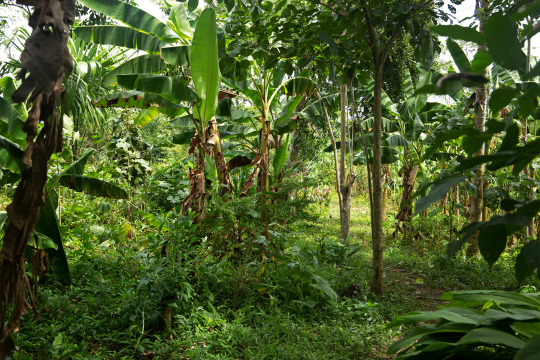
Pictured: Remberto Gil’s house is surrounded by an agroforestry system where turkeys and other animals graze under fruit trees such as maracuyá (Passiflora edulis), papaya (Carica papaya) and banana (Musa acuminata colla). Medicinal herbs like toronjil (Melissa officinalis) and tres bolas (Leonotis nepetifolia), and bushes like ají (Capsicum baccatum), yam and frijol diablito (beans) are part of the undergrowth. Image by Monica Pelliccia for Mongabay.
“Climate change is scary due to the possibility of food scarcity,” says Rodrigo Hernandez, a local authority with the Santa Isabel community. “Our ancestral seeds offer a solution as more resistant to climate change.”
Based on their experience, farmers say their ancestral seed varieties are more resistant to high temperatures compared to the imported varieties and cultivars they currently use. These ancestral varieties have adapted to the region’s ecosystem and require less water, they tell Mongabay. According to a report by local organization Grupo Semillas and development foundation SWISSAID, indigenous corn varieties like blaquito are more resistant to the heat, cariaco tolerates drought easily, and negrito is very resistant to high temperatures.
The Zenù diet still incorporates the traditional diversity of seeds, plant varieties and animals they consume, though they too are threatened by climate change: from fish recipes made from bocachico (Prochilodus magdalenae), and reptiles like the babilla or spectacled caiman (Caiman crocodilus), to different corn varieties to prepare arepas (cornmeal cakes), liquor, cheeses and soups.
“The most important challenge we have now is to save ancient species and involve new generations in ancestral practice,” says Sonia Rocha Marquez, a professor of social sciences at Sinù University in the city of Montería.
...[Despite] land scarcity, Negrete says communities are developing important projects to protect their traditional food systems. Farmers and seed custodians, like Gil, are working with the Association of Organic Agriculture and Livestock Producers (ASPROAL) and their Communitarian Seed House (Casa Comunitaria de Semillas Criollas y Nativas)...
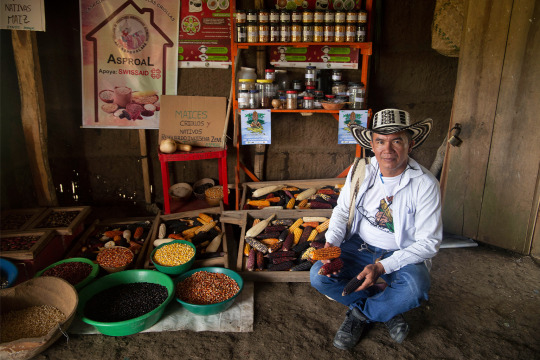
Pictured: Remberto Gil is a seed guardian and farmer who works at the Communitarian Seed House, where the ASPROL association stores 32 seeds of rare or almost extinct species. Image by Monica Pelliccia for Mongabay.
Located near Gil’s house, the seed bank hosts a rainbow of 12 corn varieties, from glistening black to blue to light pink to purple and even white. There are also jars of seeds for local varieties of beans, eggplants, pumpkins and aromatic herbs, some stored in refrigerators. All are ancient varieties shared between local families.
Outside the seed bank is a terrace where chickens and turkeys graze under an agroforestry system for farmers to emulate: local varieties of passion fruit, papaya and banana trees grow above bushes of ají peppers and beans. Traditional medicinal herbs like toronjil or lemon balm (Melissa officinalis) form part of the undergrowth.
Today, 25 families are involved in sharing, storing and commercializing the seeds of 32 rare or almost-extinct varieties.
“When I was a kid, my father brought me to the farm to participate in recovering the land,” says Nilvadys Arrieta, 56, a farmer member of ASPROAL. “Now, I still act with the same collective thinking that moves what we are doing.”
“Working together helps us to save, share more seeds, and sell at fair price [while] avoiding intermediaries and increasing families’ incomes,” Gil says. “Last year, we sold 8 million seeds to organic restaurants in Bogotà and Medellín.”
So far, the 80% of the farmers families living in the Zenù reserve participate in both the agroecology and seed revival projects, he adds."
-via Mongabay, February 6, 2024
#indigenous#ecology#agroforestry#agriculture#traditional food systems#traditional medicine#sustainable agriculture#zenu#indigenous peoples#farming#colombia#indigenous land#traditional knowledge#seeds#corn#sustainability#botany#plant biology#good news#hope#climate action#climate change#climate resilience#agroecology#food sovereignty
1K notes
·
View notes
Text
Making Desert Land Fertile with Water Bunds
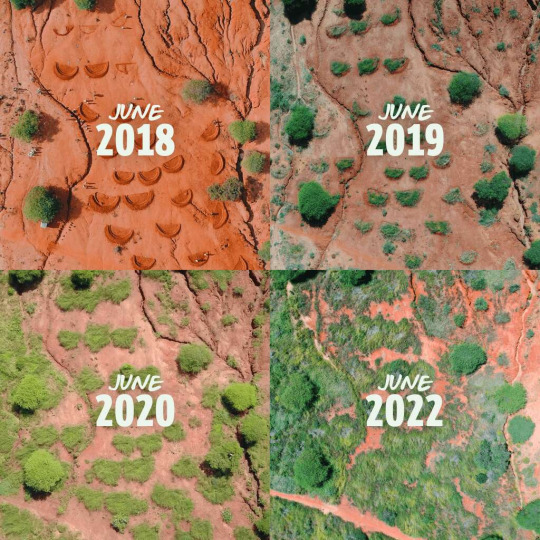
#permaculture#regenerative ag#regenerative agriculture#agriculture#farming#gardening#how to make soil more fertile#how to turn a desert into fertile land#soil#soil fertility#organic farming#organic gardening#water harvesting
3K notes
·
View notes
Text
Every once in a while I’ll see some posts about everyone should become vegan in order to help the environment. And that… sounds kinda rude. I’m sure they don’t mean to come off that way but like, humans are omnivores. Yes there are people who won’t have any animal products be it meat or otherwise either due to personal beliefs or because their body physically cannot handle it, and that’s okay! You don’t have to change your diet to include those products if you don’t want to or you physically can’t.
But there’s indigenous communities that hunt and farm animals sustainably and have been doing so for generations. And these animals are a primary source of food for them. Look to the bison of North America. The settlers nearly caused an extinction as a part of a genocide. Because once the Bison were gone it caused an even sharper decline of the indigenous population. Now thankfully Bison did not go extinct and are actively being shared with other groups across America.
Now if we look outside of indigenous communities we have people who are doing sustainable farming as well as hunting. We have hunting seasons for a reason, mostly because we killed a lot of the predators. As any hunter and they will tell you how bad the deer population can get. (Also America has this whole thing about bird feathers and bird hunting, like it was bad until they laid down some laws. People went absolutely nuts on having feathers be a part of fashion like holy cow.)
We’re slowly getting better with having gardens and vertical farms within cities, and there’s some laws on being able to have a chicken or two at your house or what-have-you in the city for some eggs. (Or maybe some quails since they’re smaller than chickens it’s something that you’d might have to check in your area.) Maybe you would be able to raise some honey bees or rent them out because each honey tastes different from different plants. But ultimately when it comes to meat or cheese? Go to your local farmers. Go to farmers markets, meet with the people there, become friends, go actively check out their farm. See how the animal lives are and if the farmer is willing, talk to them about sustainable agriculture. See what they can change if they’re willing. Support indigenous communities and buy their food and products, especially if you’re close enough that the food won’t spoil on its way to you. (Like imagine living in Texas and you want whale meat from Alaska and you buy it from an indigenous community. I would imagine that would be pretty hard to get.)
Either way everything dies in the end. Do we shame scavengers for eating corpses they found before it could rot and spread disease? Do we shame the animals that hunt other animals to survive? Yes factory farming should no longer exist. So let’s give the animals the best life we can give them. If there’s babies born that the farmer doesn’t want, give them away to someone who wants them as a pet. Or someone who wants to raise them for something else. Not everyone can raise animals for their meat. I know I can’t I would get to emotionally attached. I’d only be able to raise them for their eggs and milk.
Yeah this was pretty much thrown together, and I just wanted to say my thoughts and throw them into the void. If you have some examples of sustainable farming/agriculture, please share them because while I got some stuff I posted from YouTube, I’m still interested to see what stuff I might’ve missed!
#solarpunk#farming#hunting#agriculture#sustainability#sustainable farming#sustainable agriculture#like Rewilding farm land is pretty interesting and trying to replicate an ecosystem with farm animals but also allowing wild animals#to make homes in the rewild farm land is pretty cool#and I have an absolute love for food/garden forests#and hydroponics have shown to be really great for communities in the winter time and they want to have fresh produce#all sorts of cool stuff
940 notes
·
View notes